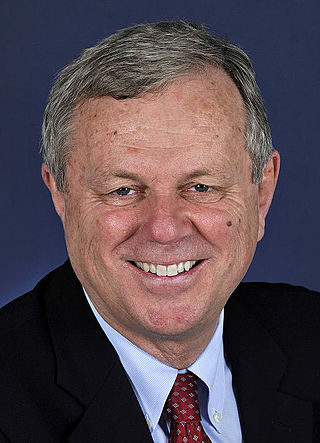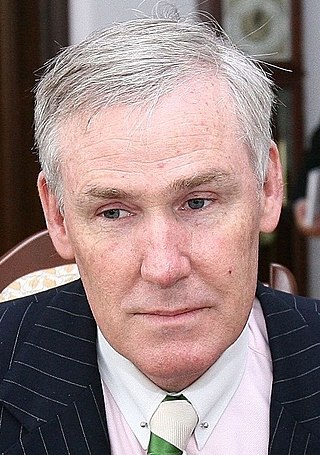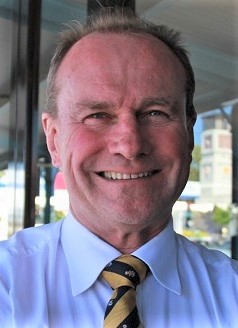Career
Prior to working in politics, Hood worked in pharmaceuticals as a financial executive for Johnson & Johnson. [4] [6] [1] [7] He became the Federal Director for the Family First Party in 2005 and ran for the South Australian Legislative Council the following year as their primary candidate. [8] [1] He was elected to the upper house in 2006 and, in February 2007, replaced Andrew Evans as the Family First Party's parliamentary leader. [4] [5] At this time, he was also serving as the party's treasurer and was a member of the Social Development Committee. [1]
He was reelected in 2014 still on the Family First ticket [9] but followed Robert Brokenshire to the Australian Conservatives when the two parties merged in 2017. Nine days after the 2018 state election, Hood defected to the Liberal Party following the Conservatives' extreme defeat, a move he was roundly criticised for. [10] He claimed that the Liberal Party's platform overlapped significantly with his, while the Conservatives were too focused on federal issues and were likely to have "no impact" at the state level. [2] Between 2020 and 2022, he was a government whip. [3]
In 2016, he was Chair of the Committee of the South Australian Parliament and Member of the Legislative Council. [11] In April 2020, he served on the South Australian Parliament's COVID-19 Response Committee. [12] Hood generally subscribes to Keynesian economics. [4]
Political stances
Crime
In 2014, Hood argued that the government overregulates people and that, while it has its purposes, it has become too large. [4] In a similar vein, he suggested the removal of compulsory voting in 2009, claiming it undemocratic to force people to cast a vote. [13] In 2008, he unsuccessfully pushed for stricter sentences for criminals' second offences. [14] In 2013, he said that while "rehabilitation is a goal that should always be pursued,... public safety must be the absolute priority" and that punishing criminals should take precedence. [15] In 2011, he introduced a law to increase police's powers to seize the computer of a convicted child molester without a court order for the purpose of examining its contents. The law also allowed judges to restrict pedophiles' internet usage. [16]
In 2017, he supported an anti-bullying bill based on Brodie's Law, which passed in Victoria in 2011. He said that existing anti-bullying approaches were insufficient and needed to be stricter. [17] In 2018, he opposed the continuation of Safe Schools, a policy that reduced bullying of LGBTQ+ students and trained staff on how to deal with sexuality-based abuse. [18] In 2010, he noted that the state coroner needed more resources to address the backlog in cases. [19] The following year he also advocated for the creation of a police task force to address the backlog of unexecuted arrest warrants. [20]
Sex and drugs
Hood's staunch anti-prostitution beliefs, which in 2011 he said were consistent with his Christian feminist positions, have remained stable throughout the years. [21] [22] In 2015, he believed that decriminalising prostitution would be akin to the government's encouragement and approval to partake in sex work. [23] That same year, despite not supporting decriminalisation, Hood criticised the proposed bill for failing to adequately protect sex workers. [24] In 2019, he again voted against decriminalisation. [25]
In 2007, Hood was also opposed to providing sex ed to primary school children [26] [27] and in 2011 questioned the effectiveness of existing sex ed programs after the prevalence of sexually transmitted infections increased substantially within a year. He called for stricter messaging from schools about safe sex. [28] He has also expressed dislike of sex ed courses that do not teach abstinence before marriage. [5]
In 2008, Hood called for a review of the motion picture classification system, as he did not feel the Advertising Standards Board had properly screened out materials of "poor taste," including a liquor advertisement showing the exposed buttocks of three adult men. [29] [30] He also suggested DVDs of adult films and other restricted content be required to come in plain packaging. [31]
Hood is also highly supportive of increased penalties for drug use. [32] In 2007, he suggested tougher controls on the growing and possession of cannabis. Possession of commercial quantities ($40,000), he pointed out, would only incur a small fine (with a maximum of $500), which was an insufficient disincentive. [33] He also rejected the idea of medical marijuana, saying the harm outweighs the therapeutic benefits. [34] In 2010, he requested on-the-spot fines for users of heroin, methamphetamines, cocaine, and ecstasy. [35] He opposed the use of drugs while driving [36] and in public, saying it is a threat to the welfare of residents, businesses, and the individuals themselves. [37] Apart from increased fines, Hood also suggested pragmatic drug testing devices at hotels and nightclubs. [38] In 2009, Hood proposed laws to adopt this stance by setting minimum, [39] as opposed to maximum, sentences, which are rarely implemented by judges. [40] In 2013, he expressed an interest in dramatically increasing fines for growing marijuana, with maximum penalties for up to five plants increasing from $100 to $2,000 and up to 19 plants from $2,000 to $10,000. He felt that this would be an effective deterrent. [41] In 2014, he encouraged people to seek out the "less harmful" alternatives available rather than use marijuana. [42]
Health
In 2011, Hood opposed the voluntary euthanasia legislation introduced by Steph Key, [43] claiming it failed to provide sufficient corroborative evidence of the desire for suicide apart from the killer as the sole witness, [44] and that the elderly and dying could be pressured into suicide if they felt that they became a burden on their family. [45] [46] In 2021, he reasserted this belief and suggested improving palliative care instead. [47] He also rejected legislation permitting the cloning of human embryos [48] on the grounds of technology already having the ability to create embryonic stem cells without using human embryos and eggs, thereby making the legislation unnecessary.
Family
Another of Hood's strong stances is opposition to both same-sex marriage and same-sex parenting. In 2011, he stated that legalising either would take away a child's right to having heterosexual parents. [49] He reaffirmed both of these beliefs again in 2014 [50] [51] [4] and in 2016 proposed an amendment allowing medical professionals to refuse reproductive assistance to same-sex couples and single people. [52] Relatedly, Hood encourages the practice of adoption for heterosexual parents [53] and has criticised abortion rates, particularly when considering low fertility rates. [54] In 2021, he again voted against the decriminalisation of abortion. [55] [56]
In 2008, Hood advocated for mandatory parental consent for children to get a body piercing [57] and worked with John Rau to outlaw scarification for minors. [58] Hood is a supporter of parents doling out non-sexual corporal punishment, namely spanking, to their children. [59] [60] To fight child abuse, he suggested pragmatic checks by agencies other than the Department of Human Services, which had been garnering dissatisfaction from South Australians at the time. [61] In 2011, he submitted a bill that allowed parents more access to and control over their child's Facebook activity. [62] [63]
Misc
In 2007, Hood rejected the scrapping of parliamentary prayer, pointing out that the practice dated back to the Westminster system. [64] He stated that these periods were useful for quiet introspection. In 2009, he rejected the Greens' call to name and shame religious schools that discriminate based on sexual orientation on their web site. [65]
In 2007, Hood called for a ban of nudist beaches, citing his concern that children could be inadvertently exposed. [66] In 2009, he promoted policies permitting the right to remove dangerous, sick and dying trees, and endorsed weekly garbage collection, which the Greens party strongly opposed. [67] [68] In 2011, he established a parliamentary committee to evaluate the environmental, economic, and social impacts of establishing marine parks off the coast of South Australia. [69] He also supported the redevelopment of the Adelaide Oval with some amendments. [70]
Following the 2010 election, Hood worked with other politicians to improve funding for mental healthcare, disability support, child protection, and public housing. [71]

Michael David Rann,, is an Australian former politician who was the 44th premier of South Australia from 2002 to 2011. He was later Australian High Commissioner to the United Kingdom from 2013 to 2014, and Australian ambassador to Italy, Albania, Libya and San Marino from 2014 to 2016.

The Family First Party was a conservative political party in Australia which existed from 2002 to 2017. It was founded in South Australia where it enjoyed its greatest electoral support. Since the demise of the Australian Conservatives into which it merged, it has been refounded in that state as the Family First Party (2021), where it contested the state election in 2022, but failed to win a seat.
Robin Rhodes Millhouse, QC was, at various times, the 39th Attorney-General of South Australia, the first Australian Democrats parliamentarian, and the Chief Justice of both Kiribati and Nauru and a judge of the High Court of Tuvalu.

The state election for the 51st Parliament of South Australia was held in the Australian state of South Australia on 18 March 2006 to elect all members of the South Australian House of Assembly and 11 members of the South Australian Legislative Council. The election was conducted by the independent State Electoral Office.

Vickie Ann Chapman is a former Australian politician, representing the South Australian House of Assembly seat of Bragg for the South Australian Division of the Liberal Party of Australia between the 2002 election and May 2022. Chapman served as the Deputy Premier of South Australia and Attorney-General between 19 March 2018 and 22 November 2021 in the Marshall government. She was the first woman to hold either post.

Robert Lawrence Brokenshire is a South Australian dairy farmer and former member of the South Australian Parliament. He represented the Australian Conservatives from 26 April 2017 to election defeat in 2018, and Family First Party before that.

Michael John Atkinson, a former Australian politician in the South Australian Branch of the Australian Labor Party, was a member of the Parliament of South Australia from 1989 to 2018.

Jay Wilson Weatherill is a former Australian politician who was the 45th Premier of South Australia, serving from 21 October 2011 until 19 March 2018. Weatherill represented the House of Assembly seat of Cheltenham as a member of the South Australian Labor Party from the 2002 election to 17 December 2018, when he retired.

Nick Xenophon is an Australian politician and lawyer who was a Senator for South Australia from 2008 to 2017. He was the leader of two political parties: Nick Xenophon Team federally, and Nick Xenophon's SA-BEST in South Australia.

Martin Leslie James Hamilton-Smith is a former Australian politician who represented the South Australian House of Assembly seat of Waite from the 1997 election until his retirement in 2018. First elected as a candidate for the Liberal Party, Hamilton-Smith was the state parliamentary leader of the Liberal Party and the Leader of the Opposition in South Australia from 2007 to 2009, and a Minister in the Kerin Liberal government from 2001 to 2002.

Isobel Mary Redmond is a former Australian politician who was the member for the electoral district of Heysen in the House of Assembly from 2002 to 2018. She was the parliamentary leader of the South Australian Division of the Liberal Party of Australia and the Leader of the Opposition in the Parliament of South Australia between 2009 and 2013, and was the first female leader of a South Australian state major party. Under Redmond, the Liberals won 18 of 47 seats in the South Australian House of Assembly at the 2010 election, a gain of three from the 2006 election. She resigned as leader of the Liberal Party on 31 January 2013.

Ian Keith Hunter is an Australian politician, representing the South Australian Branch of the Australian Labor Party in the South Australian Legislative Council since the 2006 state election. Hunter served in the Cabinet of South Australia from October 2011 to 2018.
Bernard Vincent Finnigan is an Australian former politician who served as a member of the South Australian Legislative Council from 2006 until 2015. He was appointed in May 2006 as a member of the South Australian Branch of the Australian Labor Party to the Legislative Council in a casual vacancy triggered by the death of Terry Roberts. Elected at the 2010 election, Finnigan briefly served in the Rann government cabinet from February until April in 2011, when Labor suspended him from the party, sitting thereafter as an independent backbencher until his 2015 parliamentary resignation. He was the Acting Police Minister at the time of his arrest.
Mary Josephine Fisher is a former Australian politician. She was a Liberal member of the Australian Senate from June 2007, representing the state of South Australia, but resigned in August 2012, after twice being charged with shoplifting.

The 2010 South Australian state election elected members to the 52nd Parliament of South Australia on 20 March 2010. All seats in the House of Assembly or lower house, whose current members were elected at the 2006 election, and half the seats in the Legislative Council or upper house, last filled at the 2002 election, became vacant.

Steven Spence Marshall is an Australian politician who served as the 46th premier of South Australia between 2018 and 2022. He has been a member of the South Australian Division of the Liberal Party of Australia in the South Australian House of Assembly since 2010, representing the electorate of Dunstan.

Sean Christopher Edwards is an Australian politician who was a member of the Australian Senate for South Australia from 2011 to 2016, representing the Liberal Party.

A by-election occurred in the South Australian House of Assembly seat of Port Adelaide on 11 February 2012. Labor's Susan Close won the seat on a 52.9 percent two-candidate-preferred (TCP) vote. The by-election was triggered by the resignation of former Deputy Premier, Treasurer and state Labor MHA Kevin Foley.

The Rann government was the state executive government of South Australia led by Premier of South Australia Mike Rann of the South Australian Branch of the Australian Labor Party (ALP) from 2002 to 2011.
The Australian Conservatives was formed in July 2016 as a conservative political activist group in Australia and as a political party in February 2017. It was led by Cory Bernardi, who had been elected to the Senate for the Liberal Party, but resigned citing disagreements with the Liberal/National Coalition, its policies and leadership under Malcolm Turnbull.















